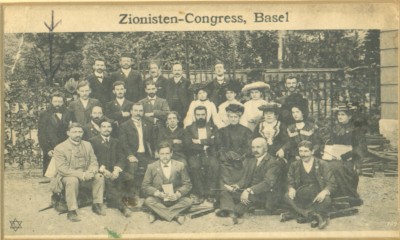The American Delegate(s)* Part III

Written by Avi Y. Decter. Originally published in Generations 2007-2008: Maryland and Israel
Part III: A National Assembly
Missed the beginning? Start here.

One of the key tasks of the organizers was to establish the Congress as an effective organization. Herzl himself, in his opening address to the Congress, declared that “Through this Congress, we are creating an agency for the Jewish people.”[1] Rosa Sonneschein reports that Herzl characterized the Congress as a “Jewish organ, which heretofore it did not have, but which it needs for its existence.”[2]
Only a few days before the first Zionist Congress convened Herzl wrote that “I stand in command of striplings, beggars, and sensation-mongers…Nevertheless, even this army would do the job if a success were in sight. Then it would quickly become a first-rate body of regular troops.”[3] Gathering a group of self-selected individuals would not make the Congress an effective body – the Congress needed to assert a claim to representing organizations and communities. This, the distinction between individual attendees and organizational delegates was made clear in the first session of the Congress, when Dr. Karpel Lippe referred in his opening remarks to “This meeting of Jewish associations and of individual Jews.”[4]
Transforming the Zionist Congress into a representative body was a critical, challenging step, and one not easily achieved. Once Herzl determined to organize a world congress and the site was finally chosen, he devoted his immense energies to gathering participants from all corners of the world. Letters of invitation were sent out to Zionist leaders, to Zionist organizations, and to Jewish communities calling for the election of representatives to the Congress.[5]
At the beginning of August, 1897, a Congress office was established in Basel, and a preparatory committee reviewed, approved, and registered the Congress participants.[6] When Herzl arrived in Basel on August 25 he took personal charge of all the details. As one observer noted, “He gave his attention to all the minutiae of the work. He let nothing slip past him. He issued the instructions, and supervised the carrying out of the instructions.”[7]
Looking back on the first Congress, Dr. Herzl wrote that “our movement has entered into the stream of history…If I were to sum up the Congress in a word – which I shall take care not to publish – it would be this: At Basel I founded the Jewish State…I gradually worked the people up into the atmosphere of a State and made them feel that they were its National Assembly.”[8] Herzl’s comment about “founding the Jewish State” has entered into the lexicon of Zionist ideology, alongside his famous dictum, “If you will it, it is no dream,” which became the slogan of the modern Zionist movement.
Herzl’s comment about creating a “national Assembly” is less well-known, and yet this seemingly more mundane task was every bit as important as providing a vision and a compelling rhetoric. On the third and final day of the Congress, it was “resolved that each local society of Zionists have a right to send on edelegate and one more for each succeeding hundred.”[9]
Afterward, Herzl wrote that “in principle the most important event which perhaps remained quite unnoticed was my introduction of the representative system, that is, of the national assembly.”[10] In this critical effort Rabbi Schaffer, a Baltimore resident, and Adam Rosenberg, a Baltimore native, played important roles. Although their routes to the first Zionist Congress were distinct, and their designation as official “Delegates’ came about in totally different ways, both deserve to be recognized and remembered as the American delegates to the first World Zionist Congress.
Continue to Sidebar I: The Other Americans: Rosa Sonneschein (1847 – 1935)
Notes:
[1] S.U. Nahon, ed., The Jubilee of the First Zionist Congress, 1897 – 1947 (Jerusalem: World Zionist Organization, 1947), 54.
[2] Sonneschein, “The Zionist Congress,” 15.
[3] Marvin Lowenthal, ed., The Diaries of Theodor Herzl (New York: Dial Press, 1956), 220. Alex Bein’s version of this same diary entry is even less flattering: “The fact is that I have only an army of schnorrers. I stand at the head of a mass of youths, beggars, and kacjasses.” Quoted in Theodore Herzl: A Biography (Philadelphia: Jewish Publication society of America, 1962), 227f.
[4] Nahon, Jubilee of the First Zionist Congress, 65.
[5] Bein, Herzl, 224.
[6] Bein, Herzl, 226ff.; Bettina Zeugin, “Three Days in Basel,” in Heiko Haumann, ed., The First Zionist Congress in 1897 – Causes, Significance, Topicality (Basel: Karegen, 1997), 141f.
[7] Quoted in Bein, Herzl, 226.
[8] Lowenthal, The Diaries of Theodor Herzl, 223f
[9] Sonneschein, “The Zionist Congress,” 18.
[10] Nahon, Jubilee, 98.
